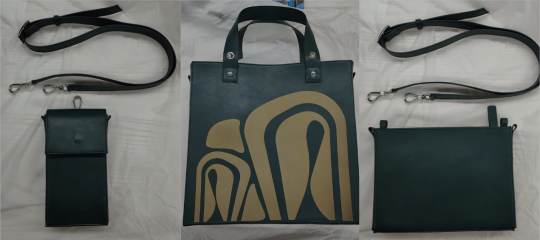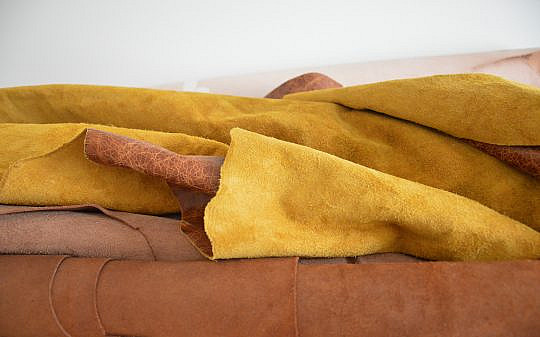
Taiwan Design Competition Winner: Lai Tsui Yu
Meet Lai Tsui Yu this year's Gold Apparel Winner in the 2021 Taiwan Student Design Competition.
“People who want to ‘buy green’ should be able to do so, confident that they aren’t being misled,” says Sarah Cardell, interim CEO of the Competition and Markets Authority (CMA) which is currently investigating fashion brands including Asos and Boohoo as part of a crackdown on greenwashing.
“Eco-friendly and sustainable products can play a role in tackling climate change,” she adds, “but only if they are genuine.”
And that’s the problem. Words are cheap, and for too long, it has been too easy for brands to make overinflated claims about their products and how sustainable they are. However, there is another way to communicate a product’s eco credentials that lets data do the talking, as pioneered by low carbon leather specialists Bridge of Weir, part of Scottish Leather Group.
In July 2022, the supplier to the world’s leading luxury car brands became the first automotive leather manufacturer to publish a so-called LCA (life cycle analysis) of its leather, providing a detailed, verified picture of its environmental impacts.
So, what exactly is an LCA? A life cycle analysis, also known as a life cycle assessment, is essentially a methodology for measuring the environmental footprint of a product or service through all stages of its life, from raw material extraction and processing to distribution, customer use, and disposal (i.e., cradle to grave). Conducted by a team of independent consultants, best practice LCAs conform to recognised standards using data that, in the case of Bridge of Weir, is third-party accredited by BSI and independently verified in line with ISO14016, the Environmental Reporting Standard.
According to Dr Warren Bowden, Scottish Leather Group’s Head of Innovation and Sustainability, Bridge of Weir’s LCA acts as “a powerful carbon accounting tool” for measuring the company’s progress towards its ambitions to achieve net-zero carbon emissions and zero waste to landfill by 2025.
Bowden says the company first decided to adopt an LCA in 2014 because it is “an independent, recognised verification of true environmental impact that, all things being equal, can be used to compare our product against others”.
The LCA also helps combat greenwashing, he added, and is valuable for both customers and the business alike. For instance, the data enables Bridge of Weir to substantiate its claims of producing the world’s lowest carbon intensity leather, which in turn helps its clients make purchases that support their own carbon reduction goals.
The data also drives improvements within the business, sometimes in surprising ways. For example, Bowden describes how Bridge of Weir’s LCA highlighted the dual benefits of water recycling, showing that it doesn’t only save water (as expected) but also acts as a major source of heat recovery.
“We can recover and reuse up to 40% volume/volume of the total water used which can reduce our heat load and avoid primary energy use by around 40%,” he said.
Also, by showing that 90% of Bridge of Weir’s impacts are down to the chemicals used, primarily in re-tanning, the LCA has prompted the company to work on “a series of innovations, including biobased alternatives to existing tanning agents and novel tannages which pioneer new techniques”.
Bridge of Weir is not alone in recognising the value of independently verified data in tracking and documenting sustainability progress in leather. Later this year will see the publication of the largest ever lifecycle assessment (LCA) in the leather industry. Led by the Leather Working Group (LWG), the project is gathering information from more than 40 LWG-certified manufacturing facilities to generate objective data on “the environmental advances made by the tanning industry and the future trade-offs it should address” that will be submitted for inclusion into the Higg Material Sustainability Index (MSI).
The data and insights generated by the LWG LCA are expected to benefit brands and retailers, supporting them in making science-based sourcing decisions and meeting their supply chain sustainability goals. According to LWG, this will further empower brands to understand the full impact of their products and better communicate them to consumers.
The benefits of LCAs are clear but currently there are very few available or shared publicly in the leather industry. However, the hope is that this will change, and the more the methodology is adopted, the easier it will be to stamp out greenwashing and let the data speak for itself. Mapping every impact of a product or service can be daunting and time-consuming for manufacturers in any industry, but such transparency is the key to producing the genuinely sustainable products that consumers want and that will help move the needle on climate change.
Download Scottish Leather Group’s 2022 ESG Report
View Bridge of Weir’s LCA summary
Read more about the Leather Working Group’s LCA project, Environmental Impact
For further insight into whether vegan fashion is sustainable, read the ‘Is vegan fashion a greenwashing con?‘ article from the Telegraph.

Meet Lai Tsui Yu this year's Gold Apparel Winner in the 2021 Taiwan Student Design Competition.

From the handmade cream leather seats to the Persian rugs used as floormats, we think it’s a pretty special car.

Silja is a 22-year-old textile design student from Finland, at Metropolia University of Applied Sciences. She possesses a strong passion for sustainability within her design work, consistently seeking and exploring new sustainable materials and solutions. Her

As much as he insists his business is market driven, Jay Jensen can’t hide his passion when he talks about wasted cowhides.